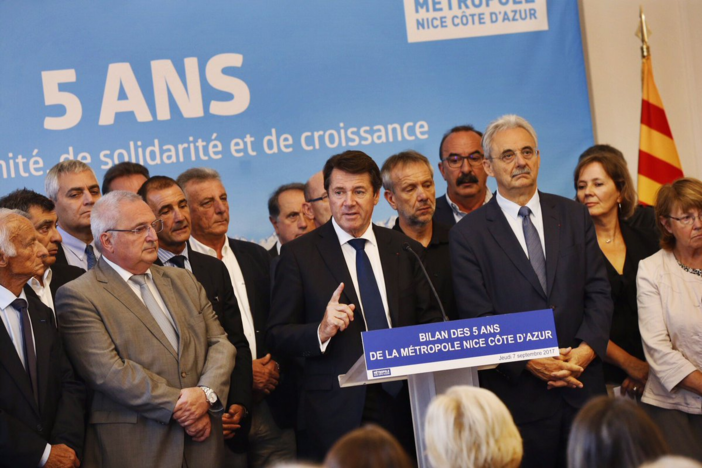During a press conference with political overtones, Christian Estrosi presented the achievements of the first 5 years of life and activity of the Metropolis, which he had strongly advocated for in his time and whose paternity he can claim, at least putatively.
This new local institution, the first (chronologically) in France, was the fruit of a visionary future for a territory (as its President likes to remind us) or a means to cement his authority over what was, at the time, largely his electoral district? Everyone will remain with their doubt, if indeed there is doubt.
Moreover, 5 years ago, the “pax politica” was still in force in the department, the alliance between the mayor of Nice and the president of the department was still solid, the ambitions of one and the other had not yet led to conflict.
Today, it is about counting presences (yesterday morning, 21 mayors responded to the call) at the event of one or the other, justifying absences to avoid suspicions of changing sides, trying to understand who is always in the photo, whatever the circumstance.
In short, while a report is being presented, it mainly serves for posturing and presenting his troops like showcasing an army and equipment to impress the adversary.
Some soft power, while waiting to put on the boxing gloves.
From this long sequence with multiple voices to show that it’s a collective action (but with only one boss), we recall the 5 points presented with the aim of demonstrating that the “Metropolis is a success” – as stated with pride by Christian Estrosi, before explaining why and illustrating the results obtained.
1) It is a model of solidarity
Over 1.8 billion have been invested in the territories, representing growth of almost 75% since 2012.
The payment of an annual Metropolitan Solidarity Grant of €10 million for the municipalities, enabling them to finance local projects (“without constantly boasting about it”, a subliminal message (?) from Christian Estrosi addressed to someone?)
Moreover, the intercommunal agreement with the Community of Communes of the Pays des Paillons and the Agglomeration Community of the French Riviera for waste management by the Ariane Energy Recovery Unit.
2) The metropolis has made economic development an absolute priority
Some significant figures:
• 1.8 billion in investments over 5 years.
• 750 million invested in municipalities, excluding transport network.
• Strong growth in our tax revenues:
– Corporate Land Contribution: +12%, or +€8.5 million,
– Contribution on the Added Value of Enterprises: +15%, or €4.3 million.
€28 million have notably been injected into the Haut country for its tourist development (especially the Mercantour resorts).
3) The municipality, the cornerstone of the system
The Metropolis defends the identity of the municipalities, which is guaranteed by the founding Charter, and there is no intention from the metropolis to extend its competences beyond its strict competences.
In fact, beyond this somewhat repetitive exercise of “fictive” equality (as George Orwell wrote, “if we are all equal, some are more equal than others”), its action is the lever of economic development, making it the center of power.
4) Good management benefiting everyone
“I will only cite three figures that speak for themselves” – said Christian Estrosi:
• 0% increase in taxes since 2008, no increase in TEOM
• Strong growth in subsidies received: €47 million in 2012 / €100 million in 2016.
• Controlled operating expenses even though the competencies exercised have been extended by the legislature.
• +75% in investments since 2012.
In the afternoon, Patrick Allemand reminded us of the soaring debt…
5) Efficient services that are cheaper than elsewhere
“Three examples come to mind” – it’s still Christian Estrosi speaking:
– Transport: €1 for any journey within the Metropolis’s territory and a network soon to be equipped with 3 state-of-the-art tram lines.
– Waste collection and cleanliness: an impeccable service has been set up in the 49 municipalities (recycling, waste recovery…) with an unchanged TEOM rate since 2005.
– Water: with the creation of the Azure Water Board, considerable investments are underway to ensure quality water and secure supply. Several municipalities have seen their rates decrease.
President’s conclusion: “Together, Municipalities and Metropolis with the Department and Region, which provide us €50 million through the Regional Territorial Balance Contract, we are stronger to successfully complete the projects necessary for harmonious development of this territory.”
No one can dispute the advancement of the territorial organization and its positive impacts thanks to an optimal pooling made possible by scale and the acquisition of quality skills; no one can lament the abandonment of a parochial mentality that has long fueled a “each for himself” mentality.
The time is for opening up and pooling: but while we must appreciate the results, can we still claim that everything is beautiful?


